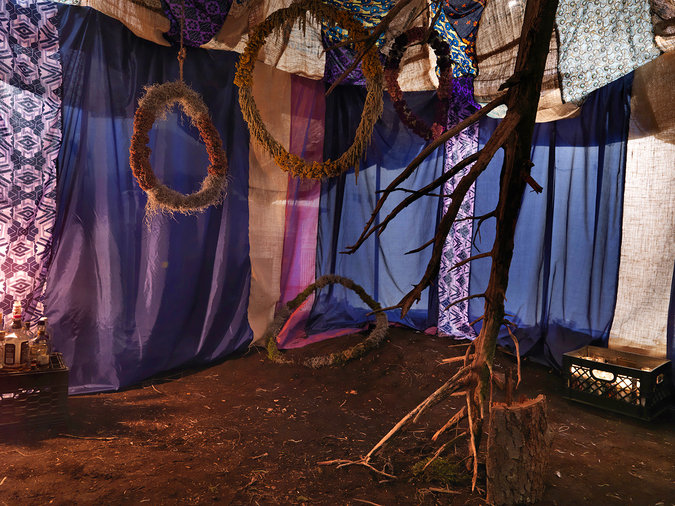ARTE: Derek Fordjour New York Times review
 Monday, November 23, 2015 at 5:00AM
Monday, November 23, 2015 at 5:00AM Derek Fordjour has a site specific installation on view now in New York City. Holland Cotter of the New York Times reviews his show. Very excited to debut new paintings from him in our January 2016 show!

Entering Derek Fordjour’s “Upper Room” from Madison Avenue is like changing planets. The small reception area in Robert Blumenthal’s third-floor gallery is carpeted with loose crushed stone, destabilizing underfoot; fragments of neon advertising signs hang from and lean against the walls. To the right, up two steps, a small door leads to a darkened larger space swathed, tent-style, in semisheer fabrics and burlap; the floor here is covered with packed earth. As your eyes adjust to the dimness you can make out tree trunks standing upright like tent poles. Wreaths of dried flowers are suspended from them.
This installation is partly autobiographical. Mr. Fordjour grew up in Memphis, a child of Ghanaian immigrants. “Upper Room” refers to places of worship: a prayer room in his family home and church revival meetings in forest clearings. Worship was intended to strengthen personal identity and safety-in-numbers solidarity, though powerful forces were set against this. A soundtrack of hymns plays in the gallery, but so does live audio from a police scanner in New York City, where the artist now lives. The installation’s atmosphere is one of menace rather than safety. It feels less like a place of communion than one of abandoned ritual. The dried flowers could easily be funeral wreaths.
Mr. Fordjour takes risks here: If he had overstated his basic image, or editorialized on it, the piece would have landed with a thud. He has trusted in the truth of materials to tell a story, and they do. “Upper Room” balances information and mystery. It comes out of personal history, but refers to larger ones, including the history of refugees who still live, destitute and unprotected, in the campgrounds that are streets of this rich city.

Reader Comments